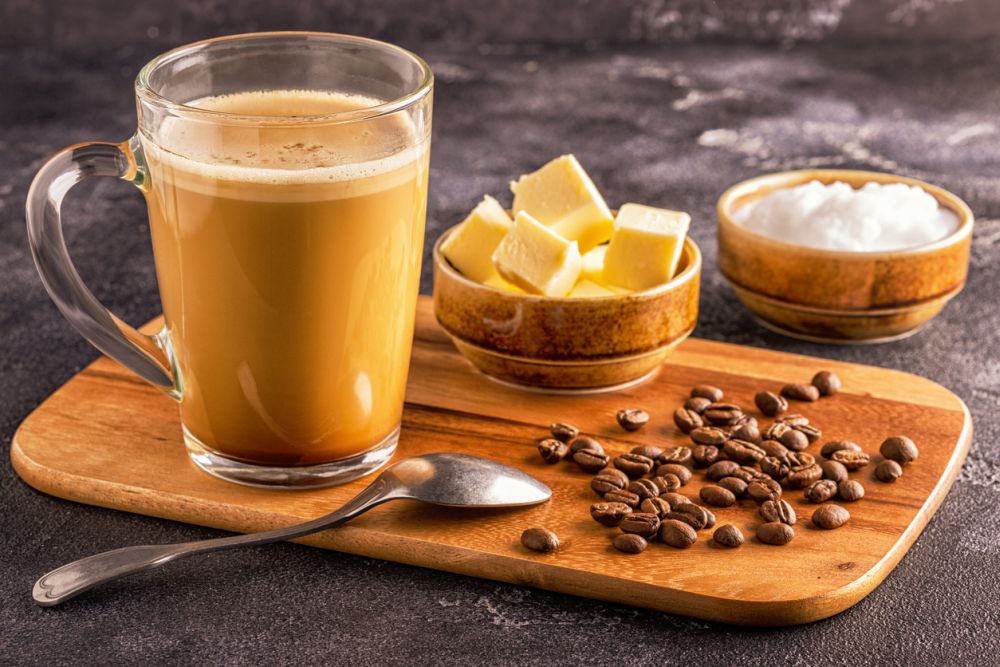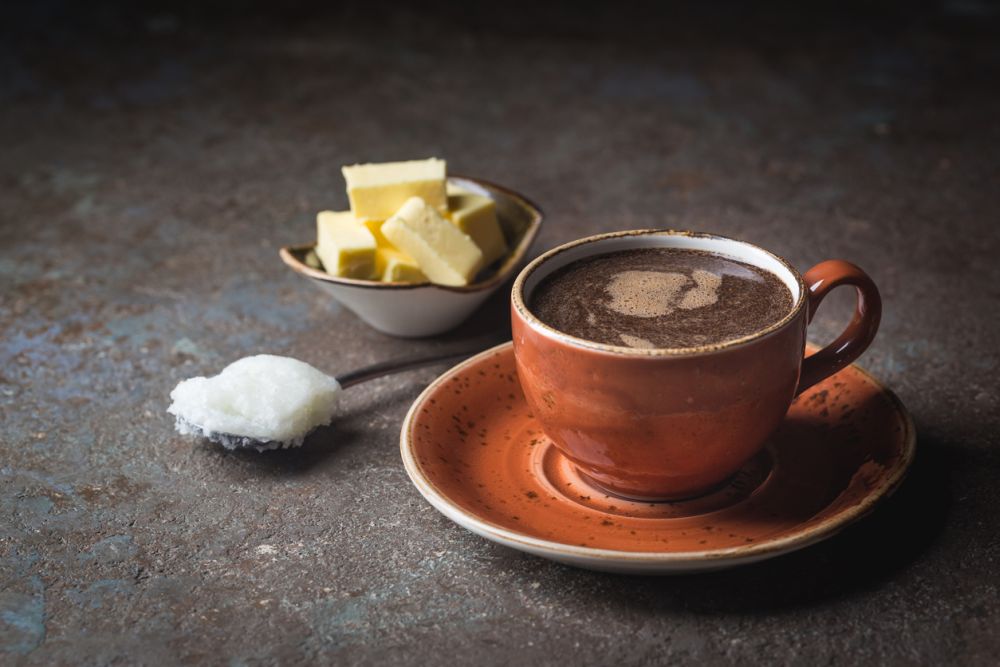If you’re the type of person who drinks coffee for health benefits, you’ve probably heard of Bulletproof coffee, which begs the question: is Bulletproof coffee organic? Let’s find out.

In this article, we’re breaking down Bulletproof coffee to find out what it is, how it’s made, and whether or not it’s organic.
You can also find out what makes a coffee organic and the best alternatives to Bulletproof coffee.
Table of Contents
- What is Bulletproof coffee?
- How to make Bulletproof coffee
- Is Bulletproof coffee organic?
- What makes a coffee organic?
- Best alternatives for Bulletproof coffee
- FAQ
- Closing thoughts
What is Bulletproof Coffee?
Whenever you hear of coffee, you think of coffee beans and water, together with some milk, cream, sugar, and other additives that will make it more suitable for your taste buds.
However, Bulletproof coffee is a one-of-a-kind coffee-based product since it’s a high-fat, low-carbohydrate drink designed to supercharge your day.
The key ingredients are:
- Coffee
- Grass-fed unsalted butter
- MCT oil from organic coconut oil
Bulletproof coffee was created by Dave Asprey, the founder, and CEO of Bulletproof 360, a company that is all about helping people upgrade their mind, body, and performance.
How to Make Bulletproof Coffee
Now that you know a bit more about what Bulletproof coffee is, let’s look at how it’s made.
Materials:
- Coffee beans
- Water
- Grass-fed unsalted butter
- MCT oil or coconut oil
Instructions:
- Brew the coffee normally.
- Add the butter and MCT oil/coconut oil.
- Use a blender to blend everything until it’s frothy.
- You can also add flavorings like vanilla extract or cinnamon.
Is Bulletproof Coffee Organic?
The answer is yes and no. The coffee beans can be organic, but the other ingredients (butter and oils) may not necessarily be organic.
For coffee to be certified as organic, all components must meet certain requirements set forth by the United States Department of Agriculture (USDA).
These requirements include using only organic ingredients and avoiding the use of synthetic fertilizers, pesticides, and other chemicals.
However, Bulletproof coffee is not technically coffee. It’s a blend of coffee, grass-fed butter, and MCT oil or coconut oil. It may not meet all of the USDA’s requirements for organic certification.
Still, that doesn’t mean that the ingredients in Bulletproof coffee aren’t organic.
For example, some brands may use organic coffee beans but non-organic butter and oils, while others may use all organic ingredients. The important thing is that you read the ingredient list to see if the products are organic.
Why Is Bulletproof Coffee Believed to Be Organic?
Presuming for the sake of argument that both the grass-fed unsalted butter and that the MCT oil is organic, this only leaves the question of whether the coffee beans are organic, and this is where Bulletproof Coffee’s claim is challenged.
According to their official website, Bulletproof coffee is made using coffee beans from Colombia, El Salvador, and Guatemala, all three of which are countries with a long history of producing coffee beans.
The same page also states that:
[…] all Bulletproof beans are purchased from Rainforest Alliance Certified […]
While this may sound promising enough, the beans are purchased from Rainforest Alliance Certified farmers is not the same are having an Organic Certification.
As mentioned earlier, all components need to be 100% organic and free of pesticides and fertilizers for Bulletproof coffee to have this certification.
Well, do a quick read of the 2020 Sustainable Agriculture Standard: Farm Requirements on the Rainforest Alliance webpage. You’ll see that the use of both pesticides and fertilizers is allowed, and what they are aiming for is a:
“Reduced use of pesticides”
Sure enough, the Rainforest Alliance is an ecologically-focused NGO, but a glance over their complete list of criteria will show how much wiggle room there is for the use of non-organic means of growth.
What Makes a Coffee Organic?
Coffees must earn the right to bear the Certified Organic tag on their packaging to be considered organic, which can be incredibly costly.
For starters, they need to demonstrate compliance with Certified Organic requirements.
Secondly, they need to pay several fees:
- Certification
- Housing and travel expenses of third-party certifying agents
While this may not sound like much for big companies, keep in mind that it’s the farmers who need to pay for this, not the company that buys the beans from them.
So, it’s not Bulletproof Coffee 360 that needs to pay these fees, but the small farmers from Colombia, El Salvador, and Guatemala.
Besides, the costs far outweigh the few extra cents they could ask for a per pound of coffee beans, so it’s more profitable for them if they don’t get the certification.
Unfortunately, this means the majority of Certified Organic farms are the ones that belong to large corporations that can afford those fees. They aren’t usually growing their coffee beans in the most eco-friendly way.
Best Alternatives for Bulletproof Coffee
If you want to drink something that’s truly 100% organic, you’re in luck since several different companies out there sell coffee that’s Certified Organic.
These companies produce their coffee beans without using any harmful pesticides or fertilizers, and they also make sure that their farmers are paid a fair wage.
Here are some great examples of 100% organic coffee:
- LifeBoost Coffee – Medium roast
- Death Wish Coffee – Strongest coffee
- Coffee Beans Direct – Dark roast
- Subtle Earth – Medium-dark roast
- Stone Street Coffee – Dark roast
We went ahead and wrote an in-depth article about the best organic coffee brands where we looked over 10 different brands and included reviews for each one.
Bulletproof Coffee (FAQ)
Discover more info about Bulletproof coffee:
Is Bulletproof coffee clean?
No, unfortunately, Bulletproof coffee is not clean since the coffee beans were grown using pesticides and chemical fertilizers.
What is the difference between Bulletproof coffee and regular coffee?
Regular coffee is made by brewing ground coffee beans in water, while Bulletproof coffee is made by blending coffee with butter and MCT oil.
Is Bulletproof coffee acid-free?
Bulletproof coffee is allegedly a low-acid type of coffee.
In fact, given the added butter and MCT oil that reduces the base acidity of the coffee even more, it is arguable that it is one of the least acidic types of coffee you can drink.
How is Bulletproof coffee processed?
The coffee beans used to make Bulletproof coffee are roasted, ground, and brewed like regular coffee.
However, the difference is that the final product is blended with butter and MCT oil, which sets it apart from regular coffee.
What does Bulletproof coffee do for you?
Besides the well-known health benefits of coffee, Bulletproof coffee comes with some other neat bonuses, given that it contains butter and MCT oil.
For example, MCT oils are metabolized quickly, making them great for weight loss, while grass-fed butter is rich in Omega-3s.
Closing Thoughts
Despite boasting plenty of pros and hidden health benefits, the fact is that Bulletproof coffee is not organic, or at least not as far as current legislation is concerned.
Nevertheless, the company is doing its part to try and increase sustainability in the coffee industry, even if its methods may be a little bit controversial.



Leave a Reply